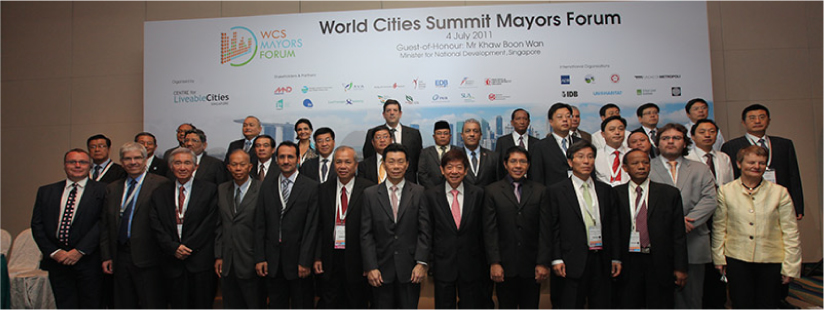Home >
About Us >
Past Editions >
Mayors Forum 2011
Mayors Forum 2011

The second annual World Cities Summit Mayors Forum was held in Singapore on 4 July 2011 and was attended by 30 governors and mayors from 28 cities in 18 countries. Themed “Building Economically Competitive, High Density and Highly Liveable Cities”, the Forum also attracted leaders and experts from international organisations, including the World Bank, UN-Habitat, the Asian Development Bank, and the Inter-America Development Bank.
Participants shared best practices and discussed urban solutions in a common effort to build liveable cities. Discussions focused on challenges of urban planning, especially in
relation to changing political leadership or when responsibility is shared with
regional or national government. There was consensus among the mayors that integrated long-term master planning is necessary for developing liveable and sustainable cities. Another successful outcome was the exchange of programmes and strategies from various cities to overcome future challenges, including a lack of technical capacity among many
municipalities, poor rule of law, and a culture of non-enforcement of rules.
The Forum also witnessed the fruition of a suggestion made at its inaugural edition in June 2010, where participants had proposed a ‘Learning Network’ for cities to share best practices. Termed the ‘Urbanization Knowledge Platform’, the new online network is a collaborative partnership between researchers, policymakers, the private sector, and knowledge brokers, including Singapore’s Centre for Liveable Cities. The platform will enable cities to share knowledge and contacts and aims to be a virtual venue for multiple stakeholders in urbanisation to contribute knowledge and learn from each other.
KEY INSIGHTS FROM THEMATIC DISCUSSIONS
Session 1: Long-term and Integrated Planning
- Long-term planning is unavoidable as cities are getting bigger and urbanisation is expected to increase.
- Long-term planning brings together long-term development with spatial planning; it requires bringing business and community into the process and strong governmental leadership.
- Good integrated long-term planning is flexible, broad and consultative; it is a phased and involves the whole of government.
- Planning needs to be done at the centre of power and within each government because it is strategic planning at a very localised level is difficult.
- Most cities in Africa and South Asia lack of capacity in terms of good planners and the municipal capacity implement those plans, which needs to be addressed.
- Planning for fundamentals like infrastructure, road connectivity and housing is more important than the visual image of the city
- Many cities don’t plan for long term because they feel they lack resources; Singapore has demonstrated that planning must be done according to what the city needs, and resources be sought later.
- Using public-private partnerships for financing are a very important component of getting plans implemented.
- The quality of the city’s governance will determine its amenability to private sector partnerships and participation.
- A good plan that shows that it would benefit all cities in an urban region may help to get cooperation of different urban governments.
Session 2: Sustainable Economic Growth for the Future
- Liveability and inclusion are key contributors to economic growth. In the long term, cities will achieve economic growth by having better people, a better society, or a more open city, rather than by having more people or a bigger city.
- Infrastructure plays a crucial role in creating the conditions for economic growth and participation. Festivals, cultural heritage and restoration along with citizen participation and engagement also contribute to the growth process.
- It is essential to provide affordable and easily accessible basic public services such as primary education, health care, sanitation, transport to the wide community, especially to poor and the unprivileged.
- Cities that are committed to inclusion do a much better job of bringing out the best in everyone. A comprehensive and inclusive urban development strategy must properly balance economic objectives with poverty reduction and environmental protection.
- Creating and ensuring sustainable livelihood should be a top priority on the development agenda. Urbanisation done well can be a powerful driver of improving the quality of life.
- Trust is a critical ingredient for establishing and reinforcing the relationships between social inclusion and economic growth. Trust enables the public to feel confident that key urban initiatives will be implemented, and urban communities thrive when the risk of uncertainty is diminished, allowing capital and human resources to be dedicated to productive activities.
- Trust can be enhanced by building robust information systems that enable the public to understand how government operates including the sources and uses of public funds.